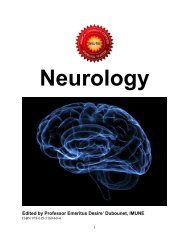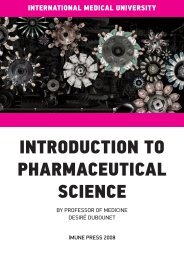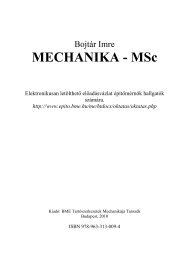Create successful ePaper yourself
Turn your PDF publications into a flip-book with our unique Google optimized e-Paper software.
and eclampsia in pregnancy. The fact that cellular magnesium levels in women with PMS are<br />
found to be significantly lower than in women who do not suffer PMS resonates the inferences<br />
of these studies. Susan Johnson, a gynaecologist at the University of Iowa who helped develop<br />
the new ACOG (American College of Obstetricians and Gynaecologist) standards advices that if<br />
you are in search of supplements that alleviate symptoms of PMS, you may benefit from calcium,<br />
magnesium and vitamins D and E.<br />
Inability to Sleep<br />
Insomnia or inability to sleep is another symptom of magnesium deficiency. If you find it difficult<br />
to sleep or find yourself waking up in the night with muscle spasms, cramps and stuffiness, you<br />
may benefit from magnesium supplementation. In a study of more than 200 patients, Dr W.H Davis<br />
of the University of Pretoria tested magnesium as a possible means of combating insomnia. 99<br />
percent of the patients on magnesium supplementation reported that sleep was induced rapidly<br />
and was uninterrupted. Waking tiredness disappeared, and anxiety and tension diminished during<br />
the day. No ill effects were noted on the patients participating in this 12-month long study in<br />
which before retiring they daily took eight tablets of 250 mgs each of magnesium chloride (W.H.<br />
Davis and F. Ziady, “The Role of Magnesium in Sleep”, Montreal Symposium, 1976) In the elderly,<br />
magnesium supplements were found to improve sleep by decreasing the release of cortisol, the<br />
stress hormone that causes sleep disruption.<br />
Weakening of the Bones<br />
For long calcium was considered the key mineral in the prevention of Osteoporosis, but new<br />
research has proved that magnesium supplementation is equally important in the treatment and<br />
prevention of osteoporosis. Magnesium comprises about 1 percent of the human bone mineral. It<br />
influences both bone matrix and bone mineral metabolism and helps our body assimilate calcium.<br />
Says Dr Barnett, an orthopaedic surgeon who has published the effects of different soil and water<br />
mineral composition levels in two US Counties on bone health: “Magnesium is perhaps, the most<br />
important single element-in bone health.” Magnesium deficiency may also be a risk factor for<br />
postmenopausal osteoporosis, as it alters calcium metabolism and affects the hormone that<br />
regulates calcium balance in the body. As the magnesium content of bone mineral decreases,<br />
bone crystals become larger and more brittle. In their study ‘Magnesium supplementation and<br />
osteoporosis’, researchers Sojka JE, Weaver CM (published in Nutrition Reviews, 1995.) found<br />
lower magnesium content and larger bone crystals in osteoporotic women and suggest that<br />
magnesium supplementation may improve bone mineral density.<br />
Muscle Tension, Spasms and Cramps<br />
Irritating little twitches in the eyelid or painful muscle cramping that wakes you up in the night are<br />
usually the first sign of magnesium deficiency. Magnesium is needed for proper muscle relaxation<br />
and contraction, and excessive muscle tension (resulting in spasms, tics and restlessness) could<br />
mean that you are magnesium deficient. As this mineral is lost through bodily fluids, athletes<br />
who sweat heavily while training or are prone to loose stools may experience cramping due to<br />
magnesium deficiency. Muscle cramping and other signs of low magnesium levels respond quickly<br />
and positively to magnesium supplements and changes in diet patterns to include foods high in<br />
the mineral.<br />
Abnormal Heart Rhythm<br />
Magnesium has a beneficial effect on the cardiovascular system. Due to its natural muscle relaxant<br />
ability, it also plays an important role in regulating blood pressure. When blood vessels are relaxed<br />
there is less resistance to the flow of blood and as a result, blood pressure is lower. Evidence<br />
suggests that low body stores of magnesium increase the risk of abnormal heart rhythms, which<br />
in turn may increase the risk of complications associated with a heart attack. In 1998, Liao F,<br />
Folsom AR and Brancati of School of Public Health, University of Minnesota conducted a large<br />
prospective study (almost 14,000 men and women) and found that increasing serum magnesium<br />
levels are associated with decreased risk of coronary heart disease in women. The Joint<br />
National Committee on Prevention, Detection, Evaluation and Treatment of High Blood Pressure<br />
recommends maintaining an adequate magnesium intake as a positive lifestyle modification for<br />
preventing and managing high blood pressure. The DASH study (Dietary Approaches to Stop<br />
Hypertension) suggests that high blood pressure can be significantly lowered by consuming a diet<br />
high in magnesium, potassium and calcium.<br />
Headaches<br />
Approximately 70% of patients who have tension headaches exhibit muscular tightness and<br />
tenderness. Numerous studies have indicated that there is a relationship between migraines,<br />
tension headaches and low levels of magnesium. The 1998 PubMed article ‘Role of magnesium<br />
in the pathogenesis and treatment of migraines’ by Clin Neurosci, Mauskop A, Altura BM,<br />
suggests that individuals who suffer from recurrent migraine headaches have lower intracellular<br />
magnesium levels than individuals who do not experience migraines. In the March 1996 issue<br />
of journal ‘Headache’, researchers reported that patients with clustered headaches were helped<br />
by magnesium therapy. “In clustered headaches, people suffer up to 20 bouts of pain daily in a<br />
single siege that can last for months. A single infusion of magnesium has ended those clustered<br />
headaches with some relief in 2 to 7 days.” More recently in 2003, Wang F, Van Den Eeden SK,<br />
Ackerson LM, Salk SE, Reince RH, Elin RJ, conducted a placebo-controlled trial in 86 children with<br />
frequent migraine headaches and found that oral magnesium oxide reduced headache frequency.<br />
Anxiousness<br />
Magnesium supplementation enjoys a broad reputation as having a calming effect on anxiety<br />
symptoms and stress levels. Mildred Seeling, who started the Journal of the American College<br />
of Nutrition in 1982 had noted an association between magnesium deficiency and anxiety<br />
symptoms in her paper “Latent tetany and anxiety, marginal Mg deficit, and normocalcemia”. A<br />
different investigation by Kara H, Sahin N, Ulusan V and Aydogdu T in 2002, studied the impact<br />
of magnesium in post-surgical patients. Patients were infused with magnesium both during and<br />
following surgery and were evaluated for anxiety levels. Patients receiving the magnesium infusion<br />
required significantly less pain medication and reported less anxiety in comparison to the control<br />
group that received no magnesium.<br />
Nervousness<br />
Magnesium regulates nerve cell function and is essential for the proper functioning of the nervous<br />
system. Its presence in adequate amounts in the synaptic gap between nerve cells controls the rate<br />
of neuron firing. Without sufficient magnesium, the nerve cells cannot give or receive messages,<br />
and sensitivity to stimulation of all kinds is heightened. Noises seem excessively loud, lights can<br />
232 233

















